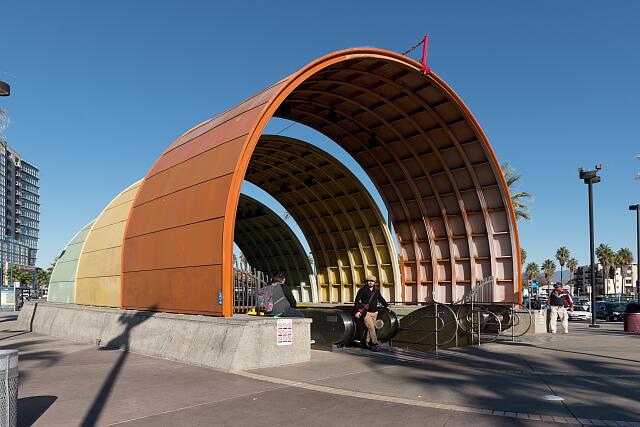Fee Exposure Frenzy Did Play Out on Appeal.
Tutor-Saliba-Perini J.V. v. L.A. County Metro. Transp. Auth., Case No. B232372 (2d Dist., Div. 7 June 16, 2014) (unpublished) ultimately came down to a situation of what party might obtain attorney’s fees in a two decades battle over compensation owed for work on the Los Angeles Metro Red Line subway project. Basically, the sureties were the victors in this one.
Entrance to North Hollywood Metro subway station in Los Angeles. Carol M. Highsmith, photographer. Library of Congress.
TSP wanted $16 million more in compensation for work on the Metro Line, but MTA initially obtained a $60 million cross-claim award reversed on appeal earlier in 2005. Then, TSP obtained a $3 million net judgment in convoluted proceedings along the way. TSP and joint issuers of public work bonds (Sureties) jointly moved for recovery of attorney’s fees of around $21.6 million based on the performance bonds and Civil Code section 1717, requests denied by the trial court—prompting an appeal by parties all around.
Sureties won this one.
TSP was properly denied fees because it conceded having no entitlement to fees under the performance bonds. Its attempt to argue that judicial estoppel should work—based on MTA’s pleadings of fee entitlement—did not pass muster based on M. Perez Co., Inc. v. Base Camp Condominiums Assn. No. One, 111 Cal.App.4th 456, 468-469 (2003).
However, a reversal was required because Sureties did prevail, even though on a procedural basis. MTA could not avoid fees under Civil Code section 1717 based on a dismissal when a judgment was inevitable against it in favor of Sureties, with the appellate court distinguishing the perceived procedural gamesmanship at issue from a different situation in Marina Glencoe, L.P. v. New Sentimental Film AG, 168 Cal.App.4th 874 (2008). Rather, the procedural victory was found sufficient based on Profit Concepts Mgt., Inc. v. Griffith, 162 Cal.App.4th 954, 952, 956 (2008).
Finally, MTA argued that fees were properly denied to Sureties based on a “unified of interest” costs denial ruling. The appellate court rejected this based on an extension of reasoning from Zintel Holdings, LLC v. McLean, 209 Cal.App.4th 431, 442-443 (2012): “We now take the final step contemplated by our analysis begun in Zintel: If a party is defined as a matter of law as the prevailing party for the purpose of costs pursuant Code of Civil Procedure section 1032, subdivision (a)(4), or attorney fees under [Civil Code] section 1717, subdivision (a), the trial court lacks discretion to refuse to award any costs or attorney fees.” (Slip Opn., p. 63.)
BLOG UNDERVIEW—The issue of whether a procedural issue gives rise to Civil Code section 1717 fee exposure is pending for review in Kandy Kiss of California, Inc. v. Tx-Ellent, Inc., Case No. S206354 (Cal. Supreme Court). However, we do not know where this case stands, because the docket reflects a Notice of Settlement was filed by the parties on March 20, 2014 and May 20, 2014—with no further disposition indicated on the supreme court’s website.

